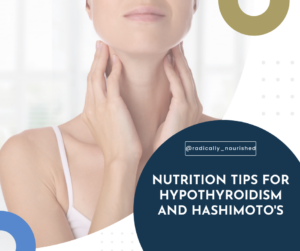Nutrition Tips for Hypothyroidism and Hashimoto’s

Thyroid problems can cause several seemingly unrelated issues throughout the body. These include changes to your weight, energy, digestion, and mood. These are all linked to the thyroid because it directs important processes that happen throughout the body. Read on to learn some nutrition tips to help support your thyroid.
Essentially, thyroid hormones help control your metabolism. When the levels are too low, metabolism slows down. Symptoms can include feeling chilly, tired, constipation, feeling down, and stubborn weight gain. Low levels of thyroid hormone is called hypothyroidism.
There are some important foods and nutrients that can help you feel better. By providing your body with proper nutrition—along with prescribed medications, if needed—you can help reduce your symptoms.
Before we dive into my nutrition tips for you, let’s start by understanding the thyroid and why it’s so important for your body and mind.
What does your thyroid do?
Your thyroid is a butterfly-shaped gland at the front of your neck that secretes thyroid hormones. These hormones control your metabolism (the way your body uses energy). These affect several processes throughout the body, including your breathing, heart rate, body temperature, and brain. When thyroid hormones are high, many systems speed up. When hormone levels are low, they slow down.
Thyroid hormones are very important during pregnancy and breastfeeding. Not only for the health of the mother but also the developing baby. Thyroid hormones help with proper development of babies’ bones, brains, and nervous systems. Because of the thyroid’s importance during pregnancy and breastfeeding, it’s very common for new moms to experience hypothyroidism. So, if you feel tired, unusually down, constipated, or have trouble regulating your body temperature after you have a baby, make sure to ask your doctor to test your thyroid hormone levels.
Low thyroid (hypothyroidism and Hashimoto’s)
Low levels of thyroid hormone (hypothyroidism) is common. Nearly 1 in 20 Americans aged 12 or older experience underactive thyroid. Overactive thyroids, or hyperthyroidism, is much less common—affecting just 1 in 100 Americans. Thyroid problems occur most often in women, people over 60 years old, and those with a family history of thyroid issues.
The most common cause of hypothyroidism is Hashimoto’s disease. This is an autoimmune condition. It happens when the body’s immune system—designed to fight off germs and infections—mistakenly attacks and destroys the body’s own cells. People with other autoimmune disorders (celiac disease, type 1 diabetes, lupus, etc.) are more likely to develop Hashimoto’s disease than those who do not have an autoimmune disease because one autoimmune condition sets the stage for others to occur.
Hashimoto’s affects thyroid function, however, only addressing thyroid hormones, without addressing the underlying autoimmune mechanism can result in unresolved symptoms and further health consequences. Addressing diet is and nutrient status is part of the therapy, as is addressing sleep, stress, toxic burden, and gut health.
Other less common causes of hypothyroidism are inflammation, iodine deficiency, other diseases, medications, or it can be present at birth.
If you have a genetic predisposition to developing an autoimmune condition or Hashimoto’s any number of these things could tip the balance toward developing the condition or exacerbate a flare:
- Certain dietary triggers
- Gluten
- Dairy
- Sodium (if not balanced with potassium) —-> there is individuality to this one, ask your functional healthcare provider
- Iodine (again individuality)
- Lectins (individuality applies here, too)
- Lack of dietary diversity – the more diverse your diet the more diverse your microbiome
- Foods sprayed with herbicides (aka glyphosate) or overexposure to it
- Foods that create chronic inflammation (for you)
- Grains (individuality applies)
- Certain lifestyle choices/issues
- Insomnia
- Sedentary
- Overtraining
- Smoking
- Alcohol
- Drug use
- Lack of rest/overwork
- Unhealthy relationships
- Unmanaged stress
- Chemical triggers
- BPA
- Pesticides
- Air pollution
- Heavy metals
- Plastics
- Synthetic fragrances
- Fire retardants
- Pathogens
- H pylori
- Candida
- Epstein Barr
- Hepatitis
- Cytomegalovirus
- Among others
Symptoms of Hypothyroidism and Hashimoto’s
There are many symptoms of hypothyroidism. Some common ones include:
- Fatigue and weakness (feeling unusually tired, having less energy)
- Weight gain
- Trouble tolerating cold (feeling chilly when others around you feel fine)
- Depression, difficulty concentrating, memory problems
- Joint and muscle pain
- Constipation
- Puffy face
- Dry or thinning skin, hair, and nails
- Heavy or irregular menstrual problems or fertility problems
- Slow heart rate
The inflammatory response of autoimmunity can disrupt thyroid hormones and its function when someone has Hashimoto’s.
Hashimoto’s Systemic Impact
- Brain inflammation
- Brain fog
- Poor brain endurance
- Poor balance and stability
- Vertigo
- Anxiety in crowded places
- Gut barrier breakdown and gut imbalances
- Multiple food sensitivities
- Autoimmune flares
- Lowed digestive enzymes and stomach acid
- Higher instances of bacterial imbalances and risk of SIBO (small intestinal bacterial overgrowth)
- Lung barrier breakdown
- Respiratory issues
- Pollen and pollution sensitivity
- Muscle inflammation
- Muscle aches and fatigue
- All over body swelling
- Face
- Belly
- Joints
- Poor thyroid hormone metabolism
- Poor conversion of T4 (inactive hormone) to T3 (active hormone)
- Poor thyroid receptor response
These symptoms can vary from person to person, and may have causes other than low thyroid. Hypothyroidism develops gradually over time, so it’s possible not to notice symptoms for months or even years.
Testing and treatment of Hypothyroidism and Hashimoto’s
Some symptoms of hypothyroidism and Hashimoto’s—weight change or fatigue—can be subtle and gradually occur over time. Blood tests can confirm whether thyroid hormone levels are too low. If you’re experiencing symptoms, it’s important to ask your healthcare provider to see if you should be tested. Left untreated, hypothyroidism increases the risks of high cholesterol, high blood pressure, and heart disease.
The standard treatment for an underactive thyroid is a medication that replaces the hormones your thyroid can no longer make. Once you and your doctor find the right dose and the right medication, many symptoms may improve dramatically. It’s important to test frequently, often more than once per year, to make sure your medication is properly dosed.
Especially with uncontrolled Hashimoto’s, thyroid labs can swing dramatically, making it very difficult to get the right dose of medication. Often, medication doses are constantly increasing due to more and more thyroid damage created by antibody production.
Here are the important labs to request from your doctor:
- TSH – which can often be normal with Hashimoto’s, especially in the early stages. Also note, there is a wide range of “normal” in standard lab ranges. Oftentimes, people will experience thyroid symptoms when their labs are at the high or low end of normal.
- T4
- Free T4
- T3
- Free T3
- T3 uptake
- Reverse T3
- TPO antibodies – when elevated should equal an autoimmune diagnosis regardless of TSH levels
- Tg antibodies – when elevated should equal an autoimmune diagnosis regardless of TSH levels
Autoimmune conditions (Hashimoto’s and celiac disease)
Some autoimmune diseases can exist for years without many obvious symptoms. Then, once the body becomes over-stressed, e.g., after a pregnancy or illness (see above for others), the symptoms may appear. These can include Hashimoto’s and celiac disease. Celiac disease is an autoimmune disease where someone experiences severe GI destruction from consuming gluten (the protein found in wheat).
If you have been diagnosed with celiac disease, be sure to stick to your gluten-free diet. Some people have reported needing lower amounts of thyroid hormone medications after a period of time on a gluten-free diet. One reason is that with the gluten-free diet the intestines are healing and they may be better able to absorb the medication. Another reason may be that the gluten-free diet reduces the levels of inflammation in the body, including inflammation of the thyroid gland, so they need less medication.
In addition to gluten, sometimes people feel better removing grains altogether. These include rice, oats, millet, buckwheat, quinoa, etc. This is because of molecular mimicry, whereby the protein molecules in these grains closely resemble the molecular structure of gluten creating a similar reaction by your immune system.
Thyroid and weight
The thyroid helps to control metabolism, so it can directly impact your weight. With hypothyroidism, the body isn’t metabolizing (using energy) as well as it could be. This means that more of the foods and drinks we consume aren’t metabolized (“used” or “burned”). This can lead to some weight gain.
Weight gain is just one of many symptoms of hypothyroidism and Hashimoto’s. Many things can cause weight gain, and therefore, it may not result from hypothyroidism. In fact, if weight gain is the only symptom of hypothyroidism, it’s less likely to be from hypothyroidism. Other factors that can affect your metabolism (and weight) are other hormones, food intake, and your own body weight.
In general, weight gain associated with hypothyroidism is about 5-10 pounds. This means that when hypothyroidism is diagnosed and treated, weight loss is fairly small. Typically, successful treatment of hypothyroidism results in a return to the body weight before the hypothyroidism developed.
Iodine, sometimes an essential mineral for thyroid hormones – but can also create more problems for some
Thyroid hormones contain the mineral iodine. This means that the thyroid needs iodine to make its hormones. Iodine deficiency is uncommon in the United States, but occurs in other areas of the world.
The recommendation for adults is 150 mcg of iodine per day. Pregnant and breastfeeding women need 220 – 290 mcg per day. The American Thyroid Association recommends that women who are planning pregnancy, pregnant, or breastfeeding take a multivitamin containing 150 mcg iodine per day (the rest of the daily iodine can come from food and drinks).
Iodine is found in seawater and some soils. Food sources of iodine are iodized salt, fish, shellfish, dairy, eggs, and soy products. Seaweed (kelp, dulse) is one food that may have high amounts of iodine.
It’s possible—especially with autoimmune thyroid disorders—to be sensitive to side effects from too much iodine. Some supplements and medications (like some cough syrups) contain high levels of iodine. Too much iodine may worsen hypothyroid symptoms and can increase the risk of developing an overactive thyroid. Be sure to check your product labels or ask your healthcare provider. This is why there are no one-size-fits-all recommendations and why individuality has to be taken into account with personalized recommendations.
Soy and cruciferous vegetables (cabbage, broccoli, cauliflower) contain compounds known as “goitrogens.” These can interfere with the thyroid’s ability to take in dietary iodine if consumed in large amounts. Some people are more sensitive to these than others. Consuming large amounts of these is not a concern for people who have sufficient levels of iodine. I caution people who avoid these foods altogether as they are missing out on the important benefits they have. Especially cruciferous vegetables because of their ability to increase our master antioxidant, glutathione. Glutathione is important for detoxification and managing oxidative stress/free radical damage.
Nutrition tips for taking thyroid medications
There are special dietary considerations if you’re taking thyroid medications.
Be sure to follow the instructions for taking your medications. This may mean taking it with water on an empty stomach to avoid potential interactions. After you take it, you might need to wait several hours before taking any supplements or other medications that contain iron, calcium, or magnesium. It’s also a good idea to steer clear of high-fiber foods, soy, and walnuts for those few hours, as they may reduce how much your body absorbs.
If you take thyroid medication, avoid consuming grapefruit or its juice, as these may interact. This effect may last more than several hours, so if you love grapefruit, talk to your doctor or pharmacist to see if your medication needs to be adjusted.
Nutrition Tips for Hypothyroidism
Eating a healthy diet for your thyroid can help you feel better. The following foods and nutrients do this by supporting your metabolism, digestive system, heart, and brain.
A thyroid-healthy diet includes:
- Fruits, vegetables, nuts, and seeds (these contain essential vitamins and minerals and are also sources of dietary fiber for digestive health)
- Lean protein such as eggs, poultry, lean meats, legumes (with their fiber), and fish and shellfish (with their omega-3s for heart and brain health)
- Heart-healthy oils like olive oil (with its unsaturated fats)
- Mineral-rich (especially potassium, magnesium, selenium) foods like avocados, chicken, nuts, seeds, veggies
Visit this link to access 4 great recipes to support optimal thyroid health:
Cut down on processed foods—especially those that contain hydrogenated oils and excess sodium and sugar. Minimize soft drinks, potato chips, candy, etc. that are high in calories and low in nutrients.
Final Thoughts
For thyroid health, nutrition is important. Knowing what to eat when your metabolism is slow can help you feel better and reduce your symptoms. It’s also important to know what foods and drinks to avoid in the few hours before and after taking your medications.
If you feel that you have symptoms that may be related to thyroid issues, speak with a healthcare provider. They will review your history, symptoms and help you decide if you need testing or treatment. Never stop taking your medications without speaking with your doctor or pharmacist first.
Need nutrition support for your thyroid or struggling to manage your Hashimoto’s diagnosis? Book a discovery call with me so we can talk more about it. Click my booking link below to book a time.
References
American Thyroid Association. (n.d.). Iodine deficiency. Retrieved from https://www.thyroid.org/iodine-deficiency/
American Thyroid Association. (n.d.). Thyroid and weight. Retrieved from https://www.thyroid.org/thyroid-and-weight/
European Journal of Endocrinology. (1998). Effects of small doses of iodine on thyroid function in patients with Hashimoto’s Thyroiditis residing in an area of mild iodine deficiency. Retrieved from https://pubmed.ncbi.nlm.nih.gov/9703374/
Gluten Intolerance Group. (n.d.). Celiac disease & thyroid conditions. Retrieved from https://gluten.org/2019/10/17/celiac-disease–thyroid-conditions/
Harvard Health. (2019, June 5). When depression starts in the neck. Retrieved from https://www.health.harvard.edu/diseases-and-conditions/when-depression-starts-in-the-neck
Harvard Health. (n.d.). Healthy eating for a healthy thyroid. Retrieved from https://www.health.harvard.edu/staying-healthy/healthy-eating-for-a-healty-thyroid
Harvard Health. (n.d.). Is it just midlife, or is your thyroid slowing down? Retrieved from https://www.health.harvard.edu/womens-health/is-it-just-midlife-or-is-your-thyroid-slowing-down
Hashimoto’s – Solving the Puzzle course. Taught by
Datis Kharrazian, PhD, DHSc, DC, MS, MMSc, FACN
Institute for Quality and Efficiency in Healthcare. (2017, August 10). Underactive thyroid: overview. Retrieved from https://www.ncbi.nlm.nih.gov/books/NBK279601/
Mayo Clinic. (2019, September 4). Hypothyroidism diet: Can certain foods increase thyroid function? Retrieved from https://www.mayoclinic.org/diseases-conditions/hypothyroidism/expert-answers/hypothyroidism-diet/faq-20058554
Mayo Clinic. (2020, February 1). Levothyroxine (oral route). Retrieved from https://www.mayoclinic.org/drugs-supplements/levothyroxine-oral-route/proper-use/drg-20072133
Medscape. Levothyroxine (Rx). Retrieved from https://reference.medscape.com/drug/synthroid-levoxyl-levothyroxine-342732#11
Medscape. Hashimoto Thyroiditis.Retrieved from
https://emedicine.medscape.com/article/120937-overview#a5
Molecular mimicry as a mechanism for autoimmunity. Retrieved from
https://www.ncbi.nlm.nih.gov/pmc/articles/PMC3266166/
National Institute of Diabetes and Digestive and Kidney Diseases. (2017, September). Hashimoto’s Disease. Retrieved from https://www.niddk.nih.gov/health-information/endocrine-diseases/hashimotos-disease
National Institute of Diabetes and Digestive and Kidney Diseases. (2016, August). Hypothyroidism (underactive thyroid). Retrieved from https://www.niddk.nih.gov/health-information/endocrine-diseases/hypothyroidism
NIH Office of Dietary Supplements. (2019, July 9). Iodine fact sheet for health professionals. Retrieved from https://ods.od.nih.gov/factsheets/Iodine-HealthProfessional/
NIH News in Health (2015, September). Thinking about your thyroid. Retrieved from https://newsinhealth.nih.gov/2015/09/thinking-about-your-thyroid
Synthroid. (n.d.). Taking Synthroid the right way. Retrieved from https://www.synthroid.com/starting/taking-synthroid-the-right-way
Recent Posts

Paula Sturm
RDN, FMN, NLP
Holistic Practitioner
Whole Health Practitioner Paula Storer RDN, FMN, NLP, is a Mayo Clinic trained dietitian and functional nutritionist dedicated to radically nourishing her clients – body, mind and soul. Her integrated approach treats people with autoimmunity and other chronic conditions by finding and addressing the root causes of illness. Trained in multiple scientific and mind-body modalities, she blends rigorous nutrition protocols with a holistic perspective that facilitates wellness on the physical, mental, emotional and energetic levels.
Free download
Get to the ROOT
of your autoimmunity
If you've been chasing symptoms without progress, maybe you haven't gone all the way to the ROOT. Discover the key system that drives immune health — and supports all seven levels of wellbeing.
I am here to help you
I want to hear your story and help you determine the best approach for your health. You may feel like you have tried everything. Don’t be discouraged. Let’s get you on a path toward optimal health and wellbeing.






